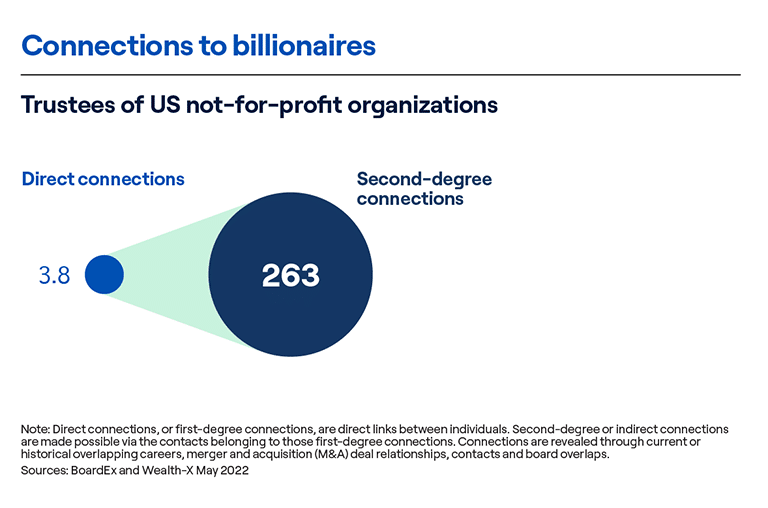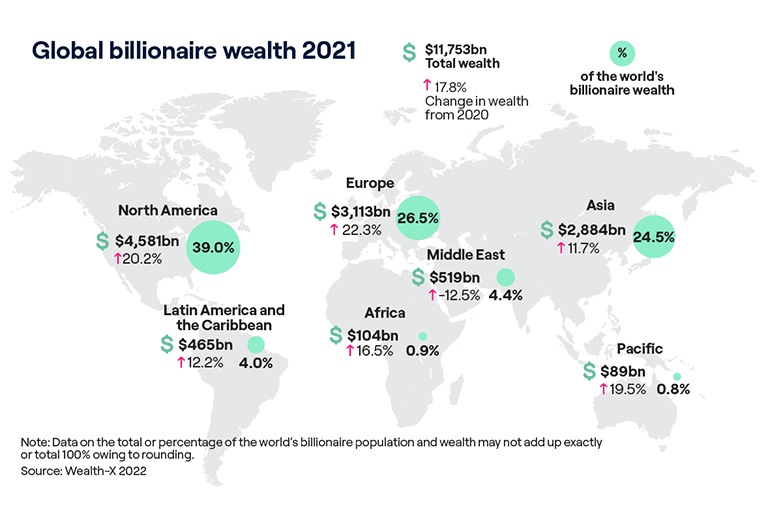Billionaire Census
2021 was the third successive year of billionaire population expansion. It was also the weakest growth since 2018. The global billionaire population rose by 3.3% to 3,311 individuals. Total wealth surged by 17.8% to a record $11.8trn. The Covid-19 pandemic remained the dominant influence. Growth was buoyed by a largely rebounding global economy and a strong upturn in corporate earnings and IPO activity.
The ninth and latest edition of the Wealth-X Billionaire Census – and our first as an Altrata company – analyses the status of the world’s billionaires. While modest in number, this global group holds immense wealth and wields a significant influence over the global economy.
The report begins with a look at the distribution of wealth among the ultra-wealthy (those with a net worth of $30m+). The study provides context on the considerable and growing influence of the billionaire class. Given their sparsity, it is crucial to employ a highly individualized approach to engaging billionaires. For the first time, using insights from BoardEx (another Altrata company), details the surprisingly high number of professional connections that CEOs and trustees of not-for-profit (NFP) organizations have to billionaires.
This year’s report reveals the top billionaire industries. It finds that technology has by far the youngest, most self-made and male billionaires. In addition, a significantly larger share of tech-focused billionaires are in the highest wealth tiers (those above $10bn and $50bn).The banking and finance sector is the dominant primary industry of the global billionaire population, followed by industrial conglomerates, real estate, tech and manufacturing, the last three accounting for around 7% each.
The Billionaire Census 2022 report reveals the five top primary industries. Of these top five primary industries, technology has by far the youngest, most self-made and male billionaires. In addition, a significantly larger share of tech-focused billionaires are in the highest wealth tiers (those above $10bn and $50bn).The banking and finance sector is the dominant primary industry of the global billionaire population, followed by industrial conglomerates, real estate, tech and manufacturing, the last three accounting for around 7% each.
A Look at Primary Billionaire Industries

- The average US CEO or non-profit trustee has a first-degree connection to almost four billionaires and second-degree connections to more than 250. Business leaders and board members’ own professional networks give them a surprisingly high number of connections to billionaires, despite their being few in number. Utilizing such connections to facilitate warm introductions is an essential part of the highly individualized approach to engagement needed for this exclusive group of individuals.
How are Corporate Executives Connected to Billionaires

- All top 15 billionaire countries recorded an increase in billionaire wealth in 2021, but changes in population were far more diverse. The US bolstered its status as the dominant billionaire country, while second-placed China saw a modest fall. Expanding by almost 20%, India jumped four places, replacing Russia as the fourth-ranked billionaire country. Russia’s billionaire numbers declined by 11%, and this was before the invasion of Ukraine and the imposition of severe international sanctions. The diverse performance illustrates the uneven impact of the pandemic (and the related recovery) on individual billionaires’ wealth holdings, given their varied exposure to industry sectors, asset markets and countries’ economies.
Global Distribution of Billionaire Wealth


